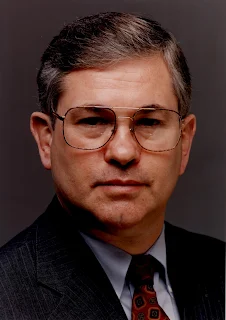William F. Brown is the author of The Undertaker, which I reviewed last month, giving it 4 stars.
William tells us more about his novel and his writing during his interview with me below.
Where did the idea for your novel The Undertaker originate?
Each of my novels starts some kind of a simple concept, a one-liner or ‘slug line’ as they call it in screen plays. The Undertaker began with, “a guy opens the newspaper and sees his own obituary.” I then start asking the questions of who, why, and what, and craft characters which fit the various story needs. I then let them take over and drive it.
My most successful novel, Thursday at Noon, began with, “a burned out CIA agent in Cairo stumbles home one night and finds a severed human head sitting on his rear stoop.” Through the Glass Darkly begins with, “a guy’s in the window seat of an air liner coming in to land at O’Hare. He looks down, and sees a man killing a woman on a roof as it flashes by below.” Then, I start asking the questions. Anyway, that’s how I do it.
How did you come up with the character of Tinkerton? Did someone you know (perhaps from the US Army) inspire the character?
For some reason I do really good villains, probably better than my heroes or lead female characters. They usually don’t drive the story, so I can have more fun with them and write them a little ‘over the top’. Tinkerton is one of my favorites, but he came 100% out of my head. Ya gotta love an evil lawyer! As my other books come on live over the next 6 months or so, you’ll see my other bad guys are pretty well drawn, too.
Can you tell us more about your own time in the US Army?
To me, it was the greatest learning experience of my life. I worked for good people and had incredible responsibilities at a very young age. That let me ‘spread my wings and learn what I can do. I did computer and systems work in Germany and was a drug counselor and company commander in Vietnam. I really wasn’t in combat, but the entire experience of being responsible for a lot of other guys teaches you about people and is life-changing.
Having published several novels now, do you have any particular writing habits?
I’ve written six now, but writing is about re-writing and it feels like I’ve written a hundred. I try to work every day and get into some regular schedule, so as to keep the threads alive. I use a computer and Word, and hate the inevitable distractions that seem determined to interrupt your best ideas.
When do you do your best work and can you describe your working space?
My best ideas seem to come in the shower or when I am running. I tend to do my best writing at night, but sometimes during the day when I have it going. My work space is a small office on the front of our condo. I used to have a problem with neck cramps when I had my monitor on the desk, so I bought a desk which has a glass center section and the monitor down under the glass below desktop level, so I’m looking down. That solved the neck problem. Beyond that, I like the desk neat, I have classical music or jazz playing, and want to be left alone. The secret to all writing is to get your butt in the chair and do it.
Do you get an opportunity to read much, and if so, who are some of your favorite authors?
It’s hard to do both. I read on trips or when I’m between books. My favorites are Michael Connolly, Stuart Woods, Lee Child, Daniel Silva, Dennis Lehane, Vince Flynn, Robert Crais, and Robert B. Parker, Hemingway, and a lot of others.
What do you have planned for 2012?
On the writing front, I have two novels presently out with my agent making their rounds with publishers . . . A War of Whispers and Winner Lose All. I am about half finished with a new one called One True Shot, and am simultaneously working on Through the Glass Darkly.
I will soon have my rights back on Thursday at Noon, which St. Martin published in hardback, and I will then put it out in e-book format. I have the first chapters of all my novels available out there, so folks can take a look. And, I’ve continued to work Facebook (William F. Brown) and to track down book blog and reviewer sites. We used to say “writing is editing.” Now, we say writing is promoting.” Anyway, that’s enough work for ten years!
That's certainly a lot of work! Thanks for stopping by Bill!
16 October 2011
Interview with William F. Brown, author of The Undertaker
Subscribe to:
Post Comments (Atom)



































